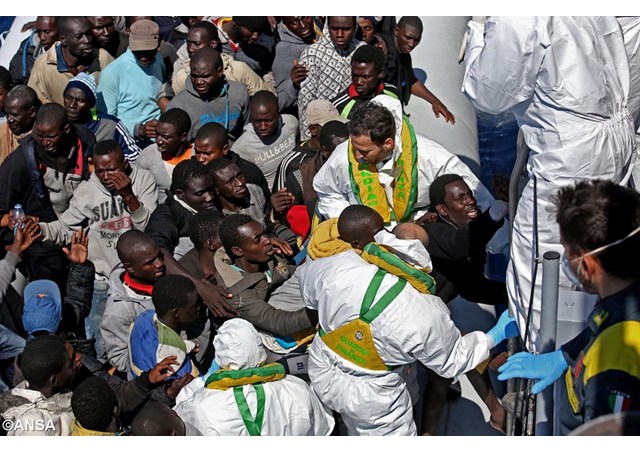
JRS reacts to EU policy: migration must be managed

(Vatican Radio) The European Commission introduced a European Agenda on Migration Wednesday – calling for the EU’s 28 member states to take in quotas of migrants and for a crackdown on people smuggling in the Mediterranean, among other measures. Some 220,000 migrants sailed to Europe last year –it is believed at least 3,500 have never made the crossing from north Africa alive.
The EU proposals are considered a “provisional emergency response” to the hundreds of thousands fleeing war and hunger in Africa and the Middle East.
James Stapleton, international communications coordinator for the Jesuit Refugee Service, says his organization welcomes a proposal that steps up measures to save lives…but the devil is in the details. He spoke with Tracey McClure shortly after the EU deliberations concluded Wednesday.
Listen to Tracey McClure's interview with James Stapleton:
“EU governments were brought together because European publics eventually said,’ we want no more people dying trying to get to Europe.’ It’s a humanitarian catastrophe,” stresses Stapleton. “European leaders thought they could just close their eyes, close the doors and people wouldn’t mind and that wasn’t the case.”
Are the measures too little, too late?
We need to put the crisis into context says Stapleton. He points out there are one million Syrian refugees alone in Lebanon, a country of four million Lebanese. “What we’re seeing is large increases of people coming because there are a number of humanitarian crises in the world at the moment and this is the reason why they’re coming.”
What EU governments are proposing are measures to save lives, he notes, “but when you get over the headlines, how they say they’re going to…save lives, we find that they’re not going to be going into international waters where most people die. They’re also talking about, but we don’t know how they’re going to do it, destroying the boats of smugglers. “A: we’re concerned [about] how we’re going to be able to distinguish smugglers from fishermen.”
Closed door policy
“Point number 2 – and much more important – is if you prevent people from coming over, then essentially you’re going to say ‘if you’re lucky enough to get to the other side, if you’re lucky enough to evade detection, we will let you into the European Union, but if not, we are going to try to close all the doors and make sure it’s impossible for you to come. On top of that we’re going to try and come to agreement with a number of countries around to make it impossible not only for you to get to Europe, but to get to North Africa. So from what we’re seeing at the moment, the focus still is on keeping people out and trying to make sure that these humanitarian crises that will follow – not that might follow – are in the Sahara desert, they are in a Libyan detention center or they’re somewhere else.
Safe humanitarian corridors, more resettlement bases, cash needed
We need to do something about the reasons why people are leaving. We’re calling for safe humanitarian channels into the European Union. Wednesday’s conference, Stapleton says, was talking about 20,000 resettlement bases possibly in the next two years. That’s absolutely insufficient. We’re talking about 3 million Syrian refugees [alone]. we’re not talking about that Europe should take them all but they should take their fair share. There should be a massive increase in the resources which are given to the neighboring states of Syria: Lebanon, Jordan, Turkey, so they can cope with these massive influxes into their countries. “
But besides the crisis in Syria, he notes there are conflicts in Iraq, Nigeria, Eritrea, Somalia and Kenya is currently hosting 600,000 Somalian refugees.
Developing nations host 80% of world’s refugees
“It is the developing countries that are hosting 80% of the world’s refugees,” he stresses. The EU is proposing to establish just 20,000 resettlement bases. “I think statements by some political leaders in the last number of days have been nothing but shameful.”
We can’t turn off and on the tap of migration – it must be managed
“What we are calling for is courage and leadership from the political class – not to provide just a little bit of window dressing and then close the doors.
“What European leaders need to get across is that we cannot turn off and on the tap for migration. We have to learn how to manage it. People will come. We can make it easier and try and make sure those people in need of protection are protected and try and give opportunities for people to stay at home [in their countries of orgin].”
The rights of those fleeing persecution, he adds, must be respected. Often, that’s “a question of their earning some more money for their families.” JRS wants to see the EU implement a long term strategy for migration, Stapleton says, “we need a new approach, a fresh approach – one that has the possibility of both respecting human rights and… a more managed approach to migration.”
EU foreign and defence ministers are expected to meet Monday to discuss concrete military measures.
| All the contents on this site are copyrighted ©. |


